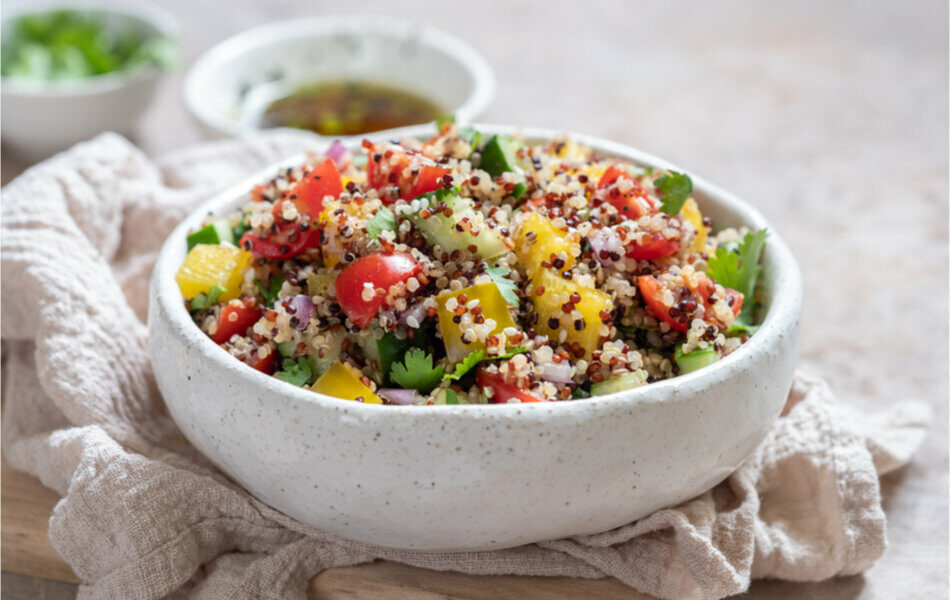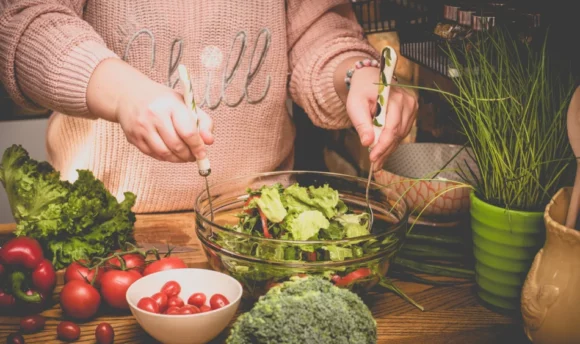Is Quinoa Good for Weight Loss? Prepare To Be Surprised
Quinoa is a popular superfood containing fiber, protein, vitamins, and minerals. But does this mean that quinoa is good for weight loss? Keep reading to find out.

Quinoa has become increasingly popular in recent years, and many people even call it a superfood. It can add tons of nutrients to many different recipes.
A walk through most health food stores will probably reveal different brands and types of quinoa available. With so many options, it can be confusing to choose the right type of quinoa for you.
You may have heard that eating quinoa has many health benefits, such as aiding in weight loss, improving your metabolic health, and regulating your blood sugar level. But what’s the truth behind the health benefits of quinoa? Let’s go over some of the key nutritional facts about this popular grain.
Is Quinoa Good for Weight Loss?
Quinoa can be a great addition to your weight loss journey as it has lots of insoluble fiber and protein. Eating quinoa can help you feel fuller for longer, making it easier to eat fewer calories.
Quinoa also helps regulate your blood sugar levels. Blood sugar imbalances are a frequent cause of cravings. Research has shown we’re more likely to crave carbohydrate-rich foods when our blood sugar is too low.
What Is Quinoa?
Quinoa is an ancient crop that originates from South America. According to Harvard, although quinoa is technically a seed, it’s actually classified as a whole grain because of its nutritional value and is naturally gluten-free.
There are different types of quinoa available, including white, red, and black quinoa. All of them have similar nutritional value but taste different.
White quinoa tends to be less bitter, while the red and black varieties have a slightly crunchy and chewy texture. It is said that black quinoa has an earthy flavor while white quinoa is slightly sweet. Since they provide the same essential nutrients, you can choose your favorite type of quinoa or combine them.
Is quinoa good for you?
Yes! Quinoa is a very healthy source of important nutrients, such as complex carbohydrates, dietary fiber, protein, antioxidants, vitamins, and minerals.
However, the outer layer of quinoa is coated in a type of antinutrient called saponins. Saponins have a bitter taste and are considered to be mildly toxic. Small quantities of saponins are unlikely to cause health issues, but they can irritate your digestive tract. An excessive saponin intake can cause symptoms like stomach pain, abdominal distension, bloating, nausea, vomiting, and diarrhea.
Quinoa Nutrition Facts
One cup of cooked quinoa contains approximately 8 g of protein. This is the same amount of protein as ½ cup of edamame, 8 oz of milk, or ½ cup of kidney, cannellini, or black beans. A cup of quinoa also contains approximately 40 g of carbohydrates, 3.5 g of fat, and 5 g of fiber.
Unlike many other sources of plant-based protein, quinoa is a complete protein. This means that it contains the 9 essential amino acids that the human body can’t make on its own.
Quinoa also contains many vitamins and minerals, including manganese, phosphorus, copper, folate, iron, magnesium, and zinc.
And last but not least, quinoa contains healthy compounds and antioxidants. Antioxidants are substances that can benefit your overall health when you include them regularly in your diet. The antioxidants in quinoa include quercetin, squalene, kaempferol, and oxalates.
A 2009 study found that the antioxidants in quinoa can help prevent heart disease, high blood pressure, and type 2 diabetes.
The benefits of quinoa for your weight loss will largely depend on how much you’re eating. You need to be aware of your calorie intake throughout the day and portion your meals accordingly. There are many things that can add unnecessary calories to your quinoa dishes, such as sauces, oils, and nuts.
Instead, include quinoa in a healthy diet that also contains fresh vegetables and fruits, lean protein, and plenty of water. Additionally, the protein in quinoa makes it easier for you to build muscle while exercising, which is also important if you want to get in better shape.
5 Great Benefits of Eating Quinoa
Quinoa is an extremely healthy food, and it can be good for you whether you’re trying to lose weight or not. Let’s go over some of the main benefits of quinoa for your health:
#1 Helps control blood sugar levels
Quinoa is a complex carbohydrate with a relatively low glycemic index. This means that it can help stabilize your blood sugar levels.
Blood glucose imbalances make your body want to eat foods that can provide a quick burst of energy. In many cases, this leads to sugar and carbohydrate cravings.
Cravings can lead to excessive snacking and weight gain. Eating complex carbohydrates, such as quinoa, can help curb these cravings. As a result, you’ll be able to eat fewer calories while still feeling satisfied.
#2 Good for digestive health
Quinoa is packed with fiber, which is very important for good digestion. Adult men and women require anywhere between 20–40g of fiber every day.
According to healthcare experts, fiber has many health benefits, such as promoting healthy bowel movements, lowering cholesterol levels, and regulating blood glucose levels. As a result, eating fiber can reduce your risk of diabetes, heart disease, certain types of cancer, and other diseases.
#3 Naturally gluten-free
Quinoa is naturally gluten-free, making it safe to eat for people who have a gluten intolerance or celiac disease. Quinoa is a great source of protein, dietary fiber, and healthy carbs for people who are on a gluten-free diet.
People who don’t eat gluten often have trouble finding foods they can opt for. Fortunately, there are many quinoa-based products available, such as pasta, flour, and even bread.
#4 Beneficial for weight loss
The fiber and protein found in quinoa will make you feel fuller after a meal. Satiety is important for weight loss since it reduces the risk of overeating or snacking. Eating enough protein can also boost your metabolism, which helps burn more calories.
Since quinoa contains all the essential amino acids, it can also boost muscle development. This can be very helpful if you’re also exercising in order to lower your body weight.
#5 Good for your skin
The antioxidants and vitamins in quinoa can be good for your skin. This study shows that quercetin can support skin regeneration and protect skin cells from UV radiation. Another study found that squalene can hydrate and soften your skin. Quinoa contains both of these antioxidants.
Quercetin also contains vitamin A, which can stimulate collagen production, and strengthen your connective tissue. Of course, these benefits should be combined with daily sun protection (SPF) to keep your skin healthy and glowing.
How to Prepare Quinoa
The first thing you should do before cooking quinoa is to wash it. Many brands of quinoa come pre-rinsed, but it’s still a good idea to give it a quick wash to remove any leftover saponins.
Once you have rinsed your quinoa, you can prepare quinoa similarly to brown rice. In fact, you can even make your quinoa in a rice cooker!
Simply add 2 parts of liquid to 1 part of dry quinoa. You can use different liquids for cooking quinoa, including water, your favorite broth, or even dairy or plant-based milk.
Add the rinsed quinoa and cooking liquid to a large pot and bring it to a boil. Bring the heat down once the liquid boils and let it simmer for around 15 minutes.
Depending on the recipe you’re making, you can add different spices and natural flavorings to your quinoa. Spices and aromatics such as garlic, marjoram, thyme, onion, and black pepper are great for savory dishes. You can also make sweet quinoa puddings with cinnamon, vanilla, cloves, or cardamom.
Some popular and tasty ways to eat quinoa include:
- Stuffed bell peppers with quinoa and meat, chicken, or lentils
- Combined with mixed vegetables in a salad
- Mixed with beans, vegetables, and a dash of lemon juice in a burrito bowl
- Served with milk and fruit as a breakfast cereal
- Cooked with coconut milk and your sweetener of choice for a sweet pudding
How Much Quinoa Should I Eat
Your portion size of quinoa when you’re trying to lose weight will depend on several factors, such as your basal metabolic rate (BMR) and activity level. You should portion your meals, including quinoa, to stay within your recommended calorie intake.
Healthy portion sizes for quinoa can range between ¾–1 ½ cups per person. One cooked cup of quinoa contains approximately 222 calories. The daily value of calories you should eat can vary, but it typically ranges between 1,600–2,400 calories per day for women and 2,200–3,200 calories per day for men. If you want to lose weight, you’ll need to eat slightly fewer calories than the ones you burn every day.
You can always seek professional help if you’re unsure how big your portion sizes should be. A registered dietitian or nutritionist can help you assess your requirements and activity level. A professional can also help you plan different meals with quinoa to ensure that your weight loss plan is still tasty and varied.
FAQs
Technically, quinoa is a seed, but it’s classified as a whole grain or pseudocereal, similar to buckwheat, chia seeds, and amaranth. Pseudocereals are gluten-free but still have lots of protein. As a result, quinoa can be used as a whole grain in meals.
Yes, quinoa contains protein and all the essential amino acids your body can’t make. Quinoa alone doesn’t contain enough protein for a balanced diet, but it can increase the protein content of your meals, especially if you are vegan or vegetarian.
Yes. Each cup of quinoa has 5 g of fiber, which is higher than the fiber content of other whole grains such as brown and white rice. Eating quinoa often could help you have better gut health due to its fiber content.
Some of the antioxidants in quinoa, such as quercetin, have been shown to fight inflammation. This could help prevent and manage certain chronic diseases. Quinoa also contains a higher amount of polyunsaturated and monounsaturated fats when compared to other grains.
A Word From Our Dietitian
Quinoa can be a very healthy addition to your diet, whether you’re trying to lose weight or not.
Just like with any other type of food, portion sizes are very important. You’ll probably struggle to lose weight if your portion sizes are too big, even if you’re eating healthy foods like quinoa.
If you’re eating the right portions, quinoa can be a great ally for weight loss as it is a satiating and whole food. Seeking professional advice can make a big difference in your weight loss journey.
The good news is that you can make quinoa in many different ways and adjust it to your personal preferences. Quinoa can be included in different diets, such as gluten-free, vegetarian, vegan, or omnivorous diets. Finding healthy meals that you genuinely enjoy makes it a lot easier to follow a diet plan.
Conclusion
Quinoa can help with weight loss since it contains lots of dietary fiber and protein to keep you satisfied. It can also reduce cravings by regulating your blood glucose, which is important for weight loss and overall health. Additionally, quinoa contains a wide variety of vitamins, minerals, and antioxidants that can help maintain your health.
However, you need to make sure that you eat an adequate portion size to achieve your weight loss goals. If your portion sizes are too big, you may struggle to reach a calorie deficit that allows you to lose weight. Quinoa can be a great option if you want to eat a balanced diet and lose weight.

















































 Select your language:
Select your language: 








